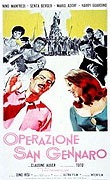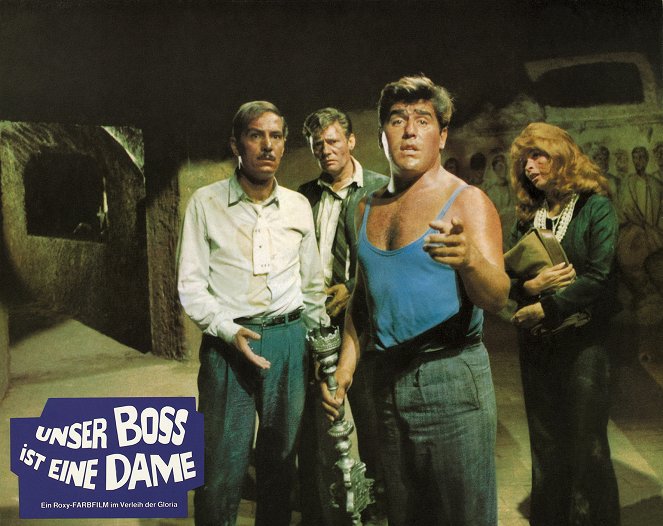Regie:
Dino RisiKamera:
Aldo TontiMusik:
Armando TrovajoliBesetzung:
Nino Manfredi, Senta Berger, Harry Guardino, Claudine Auger, Totò, Mario Adorf, Frank Wolff, Ralf Wolter, Pino Ammendola, Enzo Cannavale, Dante Maggio (mehr)Inhalte(1)
Die amerikanische Gangsterchefin Maggie fliegt als Nonne verkleidet nach Neapel. Mühelos kann sie das moderne Einbruchswerkzeug ihrer Komplizen Frank und Jack durch den Zoll schmuggeln. Maggie hat es auf den wertvollen Kirchenschatz des Heiligen Gennaro abgesehen, des Schutzpatrons der Neapolitaner. Sie möchte den Mafia-Paten Don Vincenzo als Partner gewinnen, doch er genießt den Lebensabend im gemütlichen Gefängnis und schickt sie zu Dudu. Der stadtbekannte Ganove entpuppt sich jedoch als selbstbewusster Gigolo. Maggie kann ihn erst durch ihren weiblichen Charme als Komplizen gewinnen, zum Verdruss Concettinas, der temperamentvollen Geliebten Dudus. Dieser und sein schlagkräftiger Helfer Sciascillo verblüffen die Amerikaner durch ihre Traditionsliebe. Sie bitten den Heiligen Gennaro um Verständnis für ihren Raub und weihen zudem ihre weitläufigen Familien-Clans in den Coup ein, was den schweigsamen Profi Jack zur Verzweiflung bringt. Als es endlich losgeht, landen die Ganoven nicht beim Kirchenschatz, sondern versehentlich bei der Hochzeitsfeier von Don Vincenzos Enkelin. Der herzkranke Frank überlebt das rauschende Fest nicht und stirbt an einer Alkoholvergiftung. Nach diesem Rückschlag wagen Maggie und Dudu einen zweiten Versuch. Die Straßen der Altstadt sind wegen eines Schlager-Festivals im Fernsehen wie ausgestorben, als sich die Ganoven im Labyrinth der Kanalisation an den Schatz heranpirschen. Sie stehlen das Gold und die Juwelen, doch damit geht der Ärger erst richtig los. (Verleiher-Text)
(mehr)Kritiken (1)
In this heist film, a trio of American professional thieves run up against certain specific features of Italian culture. The superstition of the locals, an authoritarian matron and a proper Neapolitan wedding interfere with the preparation and execution of their plan to steal jewels. The fulfilment of the conventions of heist movies is constantly and humorously delayed due to the setting, where chaos reigns. After the exposition, attention shifts away from the Americans and more space is given to the stars of Italian cinema, Nino Manfredi and Totò. In the role of a criminal who owes his reputation to ordinary people, whom he now contemptuously looks down on because he wants to become part of a more privileged class, Manfredi is the film’s most textured character due to his dilemma. The robbery scene, with its many effective gags reminiscent of animated slapstick (the exploding rat would probably get nixed these days), may be the most audience-pleasing segment, but the substance of the film lies elsewhere. As in his other films, Dino Risi tells the story of class differences and Italian national identity with irony and cynicism. That national identity may be based on prejudice, misogyny, pop songs and distrust of politicians (who are less respected than the mafia), but that does not in any way weaken the locals’ determination to defend their country’s traditions against American neo-colonialists (who symptomatically want to steal a treasure belonging to a revered saint). In Risi’s view, Naples is perhaps a somewhat backward place, but it is also a place where traditional Italy, which has not yet succumbed to industrialisation and consumerism, is still alive, though that is a double-edged sword. When people have wealth within their reach and it looks like the gold will end up in the hands of those who really need it (not the Church), they lose their resolve to take the next step because of their blind faith. They stay put and live in poverty. Behind the light crime comedy, there is thus concealed an unflattering or, at the very least, ambivalent portrait of Italian culture and society. 80%
()

